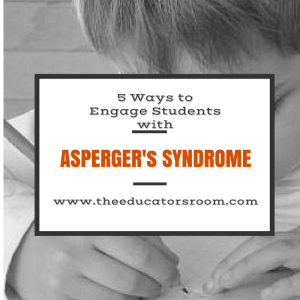 Having a student in your classroom with Asperger’s Syndrome can be a tremendous asset to your classroom community. However, since many children with Asperger’s also exhibit behaviors similar to ADD and ADHD and are prone to moodiness and sudden emotional outbursts, it can be difficult to fully engage them in class activities. Although each student with this syndrome is unique, the following tips are general enough to help you start your school year with success.
Having a student in your classroom with Asperger’s Syndrome can be a tremendous asset to your classroom community. However, since many children with Asperger’s also exhibit behaviors similar to ADD and ADHD and are prone to moodiness and sudden emotional outbursts, it can be difficult to fully engage them in class activities. Although each student with this syndrome is unique, the following tips are general enough to help you start your school year with success.
1. Use a team approach– Enlist the help of the special education teacher, guidance counselor, principal, parents, and the private therapist (if the child has one). Even if the student does not have an IEP or 504 plan, talk with the parents at the beginning of the year to make an action plan for the student. The special education teacher or guidance counselor can also act as a mentor for the student to teach appropriate social behaviors, healthy ways to manage stress, and suggestions for making friends. When designing an action plan, consult with the parents and the student to identify stressful triggers for the child, behavioral and academic goals, and steps that will be taken when the student feels overwhelmed and anxious to prevent a meltdown. Strive for frequent communication with team members to reflect on progress, goals, and next steps. Each team member should have a specific role. For example, the special education teacher may work with the student on practicing and implementing appropriate social behaviors, interpreting social cues, and organization. The guidance counselor may act as a mentor and may lead small group sessions with other students who have Asperger’s. As the mentor, the counselor will be available to meet with the student when they are near a crisis point in the classroom.
Click here for #2.


I am the mother of a 14 y/o with Aspergers and a pediatric speech-language pathologist. This is one of the best, most user-friendly and concise articles that I have read in many years. I’m printing it off for my son’s new team to read. Thank you so much!
Thank you, Melissa, for your kind words and for letting me know that I met my goal in writing this article: to help other parents and teachers. My son with Asperger’s is now 20, and it was a long journey, but we both learned and grew so much. All the best to you and your son! Lauren